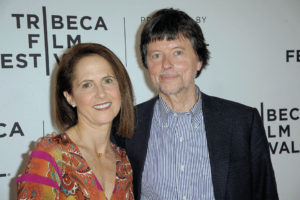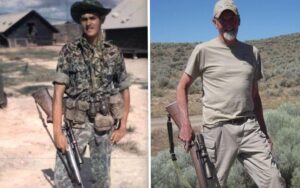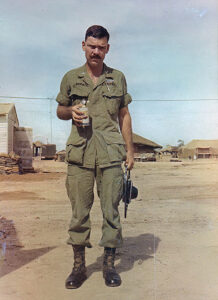We’re trying to do as good a job as we can telling the story from every perspective as we can.

The story of the Vietnam War is a story about the present as well as the past, says Ken Burns, whose documentary on the conflict, co-directed with Lynn Novick, premieres on PBS Sept. 17. Much of today’s deep political divide can be traced to fissures that emerged during the war, he says, and The Vietnam War “unpacks” that era to help viewers understand “an incredibly important moment in American history.”
More than 80 people were interviewed, including veterans, anti-war protestors and Vietnamese on both sides of the conflict. The narrator is actor Peter Coyote.
The new film is Burns’ third exploration of the nation at war, which began with The Civil War, one of the most acclaimed historical documentaries, followed by The War (World War II).
Burns, born in New York in 1953, graduated from Hampshire College in Massachusetts in 1975 and formed documentary production company Florentine Films with college classmates the next year. Their first documentary was Brooklyn Bridge, a 1981 film for PBS.
Novick, born in London in 1962 and raised in New York, graduated from Yale University in 1983 and joined Florentine Films in 1989 as an associate producer on The Civil War. She was co-director of The War. Burns and Novick discussed their film with Vietnam magazine Editor Chuck Springston.
Why did you do decide to do a Vietnam War film?
Burns: After we made the Civil War film, despite its huge popularity, we said, “We’re not going to do war anymore.” It was hard and emotionally hard. And then I read a couple of statistics. We were losing a thousand veterans of the second world war a day toward the end of the ’90s, and an outrageous number of graduating high school seniors thought we’d fought with the Germans against the Russians. We said, “OK, let us do World War II.”
As we were approaching the end of that film, we knew immediately that we were going to do Vietnam, which is the most important event in the second half of the 20th century and still seems to inform our daily life. It has veterans—not as we found with World War II at the very, very end of their lives—but not much older than me. In fact, I was eligible for the draft, but had a high draft number and the draft was stopped [in 1973].
When we made this decision 10 years ago, we were talking about partisanship in the United States then. We didn’t realize it would reach the fever pitch it’s at now. We’re not trying to score points in the present. We’re trying to do as good as job as we can telling the story of Vietnam from every perspective as we can, including as many stories as we can. But this is not an encyclopedia. People will say, did you cover that, that or that? We’ll have to say no. But we think we’ve gotten the grist of the mill.
Novick: Some people have said, “Why are you going to open old wounds? Can’t we let sleeping dogs lie?” We can’t. This is too important. It’s too painful. And it’s still here. If we don’t deal with it, it just eats away at our body politic in a really toxic situation.
How did you find people to interview?
Burns: You read. You call up. You think they’d be a good interview. You have access to Vietnam. Lynn and producer Sarah Botstein went to Vietnam and filmed a lot of people. If it had been Thursday we may not have gotten that person, but it was Wednesday, so we got that person. Somebody came to our editing room and commented on the film, and we thought their comments were interesting, so we recorded them. A lot of it is serendipity.
But at the same time you’re trying to collect a critical mass of experience so you can with confidence say, “No we didn’t tell that story, but we’ve got something that’s very similar or stands in for those kinds of experiences.” You look for people who can articulate these stories. They are South Vietnamese. They’re North Vietnamese. They’re Americans from every walk of life, from every region.
Once you’ve established that critical mass, you work with the material to shape the story, and stuff gets left on the cutting-room floor. It’s not bad stuff. It’s good stuff, but it didn’t fit. We’ve made a lot of hard decisions to tell a story that will appeal to a large general audience that may not have an intimate familiarity with the war.
How difficult was it to interview people in Vietnam?
Novick: We had great access. We explained to the Vietnamese government that we wanted to talk to ordinary people—not just retired generals, but people who really lived through it and paid the price—to hear what it was like for them, their loved ones, their friends. They said, “We never talked about the war in that way. Our people would really benefit from hearing that. What can we do to help?”
We worked with the government for support in getting around and introductions, but we had an incredible team there, an American and a Vietnamese co-producer. The American, Ben Wilkinson, executive director of the Trust for University Innovation in Vietnam, speaks fluent Vietnamese, and the Vietnamese veteran, Ho Dang Hoa, is very well-respected there.
We went around and met people the same way we do here: find those who are open, who organize their thoughts and their feelings well enough to tell a story. We would say Americans want to hear your story. “Me? Just an ordinary truck driver on the Ho Chi Minh Trail. You really want to know what it was like for me?” People said to us, “We’re going to tell the truth about what the war was really like. It was so terrible. We want the next generation to appreciate what it was like to live through this experience.”
One of the things we found so extraordinary was the scale of loss there. For Americans, the 58,000 names on the Wall is an enormous, tragic loss for our country and it’s unimaginable what those families went through. In Vietnam, there wasn’t a single person I met who didn’t know someone who died in the war. Imagine every American knowing someone who died in the Vietnam War.
The film includes more than 100 songs. Which one is your favorite?
Burns: The Vietnam era gave us some of the best music ever. There’s no way to pick a favorite song. How do you choose between Sam Cooke and the Beatles and Nina Simone and Johnny Cash and Merle Haggard? There were many songs I’ve known one way all my life. I listened to them on vinyl in high school, and I’ve sung them in my car to my children. But now I know them entirely differently because I know how they fit into the story of the Vietnam War.
Novick: It was a real privilege to work with this brilliant music. We’d walk in to the edit room, and Jimi Hendrix’s or Eric Clapton’s guitar is propelling our storytelling. We owe a tremendous debt to the artists and their heirs. Ray Charles, Bob Dylan, Joni Mitchell and the Rolling Stones—they wanted their music to be a part of this story that we’re telling. Thanks to Sarah Botstein, we were able to license over 100 songs at an unusually favorable rate.
After all the research you have done, do you think there was anything that could have made the war turn out differently?
Burns: Lots. If Truman didn’t support the French [colonial rulers fighting an independence movement] and send in secret supplies and early advisers. If Eisenhower hadn’t done the same and Kennedy had realized that who cares if he got humiliated by Khrushchev when they met in Vienna and couldn’t stop the building of the Berlin Wall. Or if Johnson didn’t look at the results of a non-
attack at the Gulf of Tonkin [a 1964 falsely claimed second North Vietnamese attack on a U.S ship after an actual attack] and decide to send up his resolution that gave him basically all the powers in the world to wage the war. If Nixon and Kissinger, who came in knowing the war had to end, had withdrawn in 1969, who knows how many American lives could have been spared?
But saying what if this and could we have done this and is somebody to blame—all these questions get in the way of a full understanding of the war because whatever happened, it happened. We want to respect the human experience of the war and not be obsessed with the Monday morning quarterbacking.
Novick: People tend to isolate the military narrative—what if we had used these military tactics or those military tactics?— and leave the politics and the domestic situation separate. But they are totally intertwined. You cannot separate them. It’s very hard to pick any decision and say if this one thing had been done differently, it would have turned out OK.
Is there any way this would have worked out in some more sanguine way? That’s a question for everyone who watches our film to talk about at great length. We look forward to having that conversation with the country.
Published in the October 2017 issue of Vietnam magazine.





